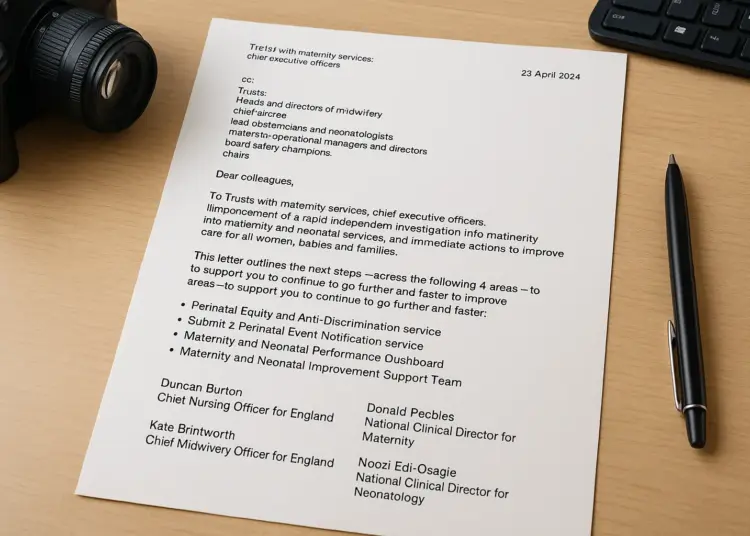Story Highlight
– Launch of Perinatal Equity and Anti-Discrimination Programme announced.
– Introduction of streamlined Perinatal Event Notification service.
– Maternity and Neonatal Performance Dashboard to enhance oversight.
– Maternity and Neonatal Improvement Support Team replaces previous programme.
– Focus on addressing inequalities and improving user experience.
Full Story
The National Health Service (NHS) is taking significant strides towards enhancing maternity and neonatal care across the UK, following recent governmental announcements aimed at addressing critical issues within these services. This initiative comes as part of a broader strategy to ensure that every woman, baby, and family receives the highest standard of care during one of life’s most pivotal moments.
In a letter sent to senior executives and maternity service leaders, the Chief Nursing Officer for England Duncan Burton, alongside key health directors, outlined a comprehensive plan to evaluate and improve service delivery. This letter details immediate actionable steps designed to foster equitable and high-quality maternity and neonatal care across the country.
Key initiatives include the introduction of the Perinatal Equity and Anti-Discrimination Programme, a proactive measure aimed at equipping perinatal teams with the necessary tools to enhance care for ethnic minority groups as well as those from socio-economic disadvantaged backgrounds. The initiative recognizes the profound impact of racism and discrimination on health outcomes, particularly for mothers and their infants. The programme will also focus on creating an inclusive workplace environment for healthcare staff. According to the officials, “We urgently need to tackle these inequities,” highlighting their commitment to support local leaders in driving meaningful change within health institutions.
Participating teams will undergo targeted training, which will encompass strategies for identifying and addressing local challenges faced by their communities. This will involve collaboration with maternity and neonatal voices partnerships, ensuring that the lived experiences of service users inform the development of improvement plans.
Additionally, the NHS is launching a new Submit a Perinatal Event Notification (SPEN) portal. This innovative web-based platform aims to simplify the process for reporting safety events, thereby reducing the administrative burden on frontline staff. By streamlining notifications to major bodies such as MBRRACE-UK and the NHS Resolution, the SPEN portal promises to enhance the efficiency and effectiveness of safety monitoring for perinatal events.
The initiative is part of a larger commitment to develop a shared Maternity and Neonatal Performance Dashboard. This dashboard will provide vital metrics to assess performance across all maternity and neonatal services, enabling trusts and integrated care boards to gain insight into their operations. The metrics will include data on obstetric unit suspensions, stillbirth rates, neonatal mortality rates, and patient satisfaction, among others.
“To further understand their services,” the officials emphasized, “the dashboard represents a balanced scorecard of operational, outcome, and patient experience measures.” This level of transparency is expected to foster accountability and improvement throughout the healthcare system.
In tandem, the Maternity and Neonatal Improvement Support Team will replace the previous Maternity Safety Support Programme. This new team is designed to expedite the identification and rectification of concerns within trusts, providing targeted support to foster rapid and sustainable improvements. The restructured process looks to reduce intervention times from several months to approximately four to six weeks, thereby allowing for immediate action where needed.
Engagement from trust boards is deemed critical for the success of these initiatives. Ensuring that executive leaders take an active and visible role in the improvement journey is integral to fostering a culture of accountability and progress. The renewal of this support structure signifies a significant shift towards prioritizing user feedback and enhancing service quality.
As these initiatives roll out, the NHS aims to create a healthcare environment that stands firmly against discrimination and biases, while continuously striving to improve safety and care quality. With these measures, the health service is poised to address longstanding issues and deliver a level of care that is both equitable and exemplary.
Additional guidance and resources will be provided to trusts as they implement these changes, with invitations for feedback to refine the programmes further. By forging partnerships between service providers, academic institutions, and community leaders, the NHS is focused on sustaining high-quality, person-centred care for all families, ensuring that every mother and baby receives the respect and care they deserve during their perinatal journey.
In conclusion, the NHS’s concerted effort to overhaul maternity and neonatal services represents an important step in championing health equity across the UK. As all stakeholders work collaboratively, the aim remains clear: to ensure safe, high-quality care that transcends barriers and truly meets the needs of the community.























These measures are a positive step toward safer and fairer care. Simplifying incident reporting and improving transparency will help identify trends and target resources where they are most needed. Success will depend on clear guidance, staff training, and adequate resourcing so that teams can act on data and deliver culturally sensitive care for all families.
These initiatives are a positive step for patient safety and equity. Simplifying incident reporting should help capture more safety intelligence and the performance dashboard can drive accountability if data is used constructively. To be effective the programme will need clear governance, resources for staff training and time to engage with communities most affected, and robust follow up so reported concerns lead to measurable improvements in care.